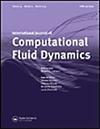预测湍流模型中机器学习辅助各向异性映射的可推广性
IF 1.3
4区 工程技术
Q4 MECHANICS
International Journal of Computational Fluid Dynamics
Pub Date : 2022-06-10
DOI:10.1080/10618562.2022.2113520
引用次数: 3
摘要
最近提出了几种用于增强湍流闭合模型的机器学习框架。然而,增强型湍流模型的可泛化性仍然是一个悬而未决的问题。我们通过系统地改变几个模型的训练集和测试集来研究这个问题。一个最优的三项张量基展开被用来开发一个模型不可知的数据驱动的湍流闭合近似。然后,对随机森林、神经网络和极端梯度增强(XGBoost)模型进行超参数优化。我们推荐XGBoost用于数据驱动的湍流闭合建模,因为它的低调优成本和良好的性能。我们还发现,机器学习模型可以很好地泛化到训练数据集中看到的流的新参数变化,但缺乏对新流类型的泛化能力。这种通用性差距表明,机器学习方法最适合为给定的流类型开发专门的模型,这是工业应用中经常遇到的问题。本文章由计算机程序翻译,如有差异,请以英文原文为准。
On the Generalizability of Machine-Learning-Assisted Anisotropy Mappings for Predictive Turbulence Modelling
Several machine learning frameworks for augmenting turbulence closure models have been recently proposed. However, the generalizability of an augmented turbulence model remains an open question. We investigate this question by systematically varying the training and test sets of several models. An optimal three-term tensor basis expansion is used to develop a model-agnostic data-driven turbulence closure approximation. Then, hyperparameter optimization is performed for a random forest, a neural network, and an eXtreme Gradient Boosting (XGBoost) model. We recommend XGBoost for data-driven turbulence closure modelling owing to its low-tuning cost and good performance. We also find that machine learning models generalize well to new parametric variations of flows seen in the training dataset, but lack generalizability to new flow types. This generalizability gap suggests that machine learning methods are most suited for developing specialized models for a given flow type, a problem often encountered in industrial applications.
求助全文
通过发布文献求助,成功后即可免费获取论文全文。
去求助
来源期刊
CiteScore
2.70
自引率
7.70%
发文量
25
审稿时长
3 months
期刊介绍:
The International Journal of Computational Fluid Dynamics publishes innovative CFD research, both fundamental and applied, with applications in a wide variety of fields.
The Journal emphasizes accurate predictive tools for 3D flow analysis and design, and those promoting a deeper understanding of the physics of 3D fluid motion. Relevant and innovative practical and industrial 3D applications, as well as those of an interdisciplinary nature, are encouraged.

 求助内容:
求助内容: 应助结果提醒方式:
应助结果提醒方式:


